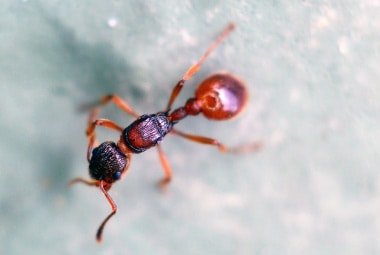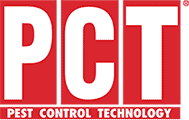
As you can tell from their name, this species of ant typically nests near or under pavement. They are not a native species; they were introduced into the United States by early colonists.
| Pest Identification | |
|---|---|
| Recognition | Adult worker pavement ants are approximately 1/8” in length; queens are slightly larger. The reproductive members of the colony are winged. Pavement ants vary in color from dark brown to black. Their head and thorax have grooved parallel lines, and the thorax has a pair of small spines extending out backwards from the rear end. |
| Biology | The stages of pavement ant development include egg, larvae, pupae, and adult. Reproductive members generally swarm from the colony in the spring. After mating, the queens will burrow underneath the soil and create a nesting site to lay her eggs. After a period of 2-3 months, workers will develop and begin to care for new eggs and developing larvae. They will also gather food and increase the size of the nest as the colony grows. If necessary, nesting locations may change in order to protect the developing young from temperature extremes and other environmental changes. |
| Habits | Pavement ants nest in cracks of driveways, under and along sidewalks, under concrete slabs, and under foundations. As they create their nests, they will pile the excavated dirt up on or next to the sidewalk or pavement. Pavement ants feed on a wide variety of food including: sweets, fruits, grease, and dead insects. These ants will often enter homes as they are foraging for food. They may be attracted to garbage, crumbs, spills, or other food that is located in your home. They may also enter your home through cracks found in the foundation or gaps found around windows or doors in basements as they come up from their underground nesting sites. This species of ant does not bite but does have a stinger. However, they are not an aggressive species and rarely use their stinger to defend themselves against people. |
| Prevention | Preventing ants and other pest problems are difficult. The best way to control ants is with a year-round pest control service. Other things that you can do to control ants around your property include: Keeping counters and floors clear of crumbs and spills, Storing food in the refrigerator and not out on counters, Washing dirty dishes often and avoid leaving them in the sink overnight or for any extended period of time, Making sure to remove trash from your home on a routine basis and store outside in containers with locking lids until trash day, Sealing any cracks in the foundation or exterior walls of your home, Installing door sweeps, Caulking gaps found around exterior windows and doors. |
| Professional | The most effective way to control pavement ants in your home and on your property is through the help of a professional pest control expert. At Rottler Pest & Lawn Solutions, a trained technician will inspect your home and find all the areas of your home where ants are nesting and foraging for food. We will then provide control services through our year-round home pest control services and offer suggestions to control and prevent future problems with pavement ants in your home. |

